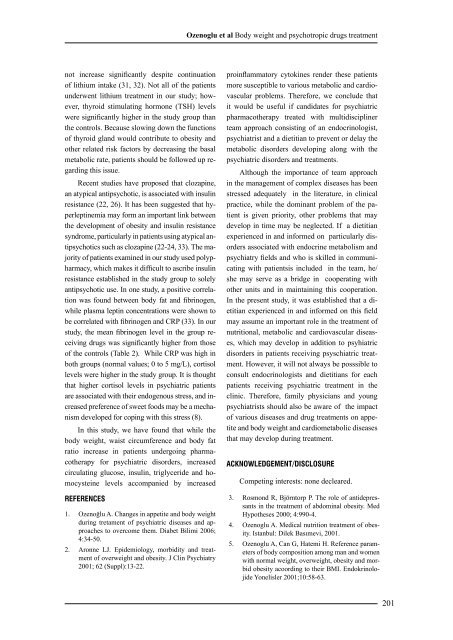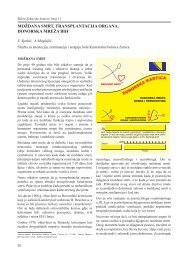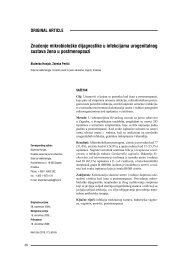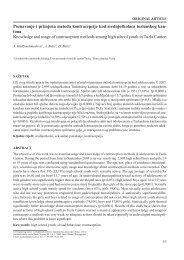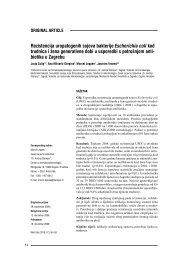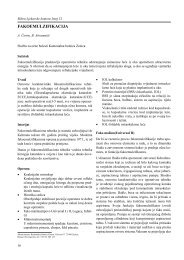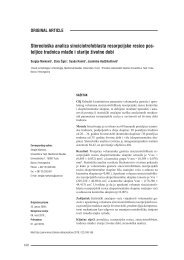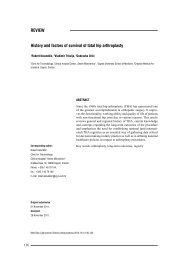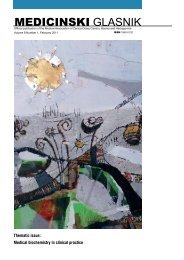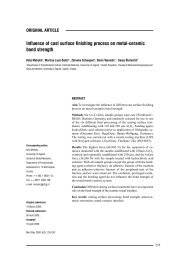MEDICINSKI GLASNIK
MEDICINSKI GLASNIK
MEDICINSKI GLASNIK
Create successful ePaper yourself
Turn your PDF publications into a flip-book with our unique Google optimized e-Paper software.
not increase significantly despite continuation<br />
of lithium intake (31, 32). Not all of the patients<br />
underwent lithium treatment in our study; however,<br />
thyroid stimulating hormone (TSH) levels<br />
were significantly higher in the study group than<br />
the controls. Because slowing down the functions<br />
of thyroid gland would contribute to obesity and<br />
other related risk factors by decreasing the basal<br />
metabolic rate, patients should be followed up regarding<br />
this issue.<br />
Recent studies have proposed that clozapine,<br />
an atypical antipsychotic, is associated with insulin<br />
resistance (22, 26). It has been suggested that hyperleptinemia<br />
may form an important link between<br />
the development of obesity and insulin resistance<br />
syndrome, particularly in patients using atypical antipsychotics<br />
such as clozapine (22-24, 33). The majority<br />
of patients examined in our study used polypharmacy,<br />
which makes it difficult to ascribe insulin<br />
resistance established in the study group to solely<br />
antipsychotic use. In one study, a positive correlation<br />
was found between body fat and fibrinogen,<br />
while plasma leptin concentrations were shown to<br />
be correlated with fibrinogen and CRP (33). In our<br />
study, the mean fibrinogen level in the group receiving<br />
drugs was significantly higher from those<br />
of the controls (Table 2). While CRP was high in<br />
both groups (normal values; 0 to 5 mg/L), cortisol<br />
levels were higher in the study group. It is thought<br />
that higher cortisol levels in psychiatric patients<br />
are associated with their endogenous stress, and increased<br />
preference of sweet foods may be a mechanism<br />
developed for coping with this stress (8).<br />
In this study, we have found that while the<br />
body weight, waist circumference and body fat<br />
ratio increase in patients undergoing pharmacotherapy<br />
for psychiatric disorders, increased<br />
circulating glucose, insulin, triglyceride and homocysteine<br />
levels accompanied by increased<br />
REFERENCES<br />
1.<br />
2.<br />
Ozenoğlu A. Changes in appetite and body weight<br />
during tretament of psychiatric diseases and approaches<br />
to overcome them. Diabet Bilimi 2006;<br />
4:34-50.<br />
Aronne LJ. Epidemiology, morbidity and treatment<br />
of overweight and obesity. J Clin Psychiatry<br />
2001; 62 (Suppl):13-22.<br />
Ozenoglu et al Body weight and psychotropic drugs treatment<br />
proinflammatory cytokines render these patients<br />
more susceptible to various metabolic and cardiovascular<br />
problems. Therefore, we conclude that<br />
it would be useful if candidates for psychiatric<br />
pharmacotherapy treated with multidiscipliner<br />
team approach consisting of an endocrinologist,<br />
psychiatrist and a dietitian to prevent or delay the<br />
metabolic disorders developing along with the<br />
psychiatric disorders and treatments.<br />
Although the importance of team approach<br />
in the management of complex diseases has been<br />
stressed adequately in the literature, in clinical<br />
practice, while the dominant problem of the patient<br />
is given priority, other problems that may<br />
develop in time may be neglected. If a dietitian<br />
experienced in and informed on particularly disorders<br />
associated with endocrine metabolism and<br />
psychiatry fields and who is skilled in communicating<br />
with patientsis included in the team, he/<br />
she may serve as a bridge in cooperating with<br />
other units and in maintaining this cooperation.<br />
In the present study, it was established that a dietitian<br />
experienced in and informed on this field<br />
may assume an important role in the treatment of<br />
nutritional, metabolic and cardiovascular diseases,<br />
which may develop in addition to psyhiatric<br />
disorders in patients receiving psyschiatric treatment.<br />
However, it will not always be posssible to<br />
consult endocrinologists and dietitians for each<br />
patients receiving psychiatric treatment in the<br />
clinic. Therefore, family physicians and young<br />
psychiatrists should also be aware of the impact<br />
of various diseases and drug treatments on appetite<br />
and body weight and cardiometabolic diseases<br />
that may develop during treatment.<br />
ACKNOWLEDGEMENT/DISCLOSURE<br />
3.<br />
4.<br />
5.<br />
Competing interests: none decleared.<br />
Rosmond R, Björntorp P. The role of antidepressants<br />
in the treatment of abdominal obesity. Med<br />
Hypotheses 2000; 4:990-4.<br />
Ozenoglu A. Medical nutrition treatment of obesity.<br />
Istanbul: Dilek Basımevi, 2001.<br />
Ozenoglu A, Can G, Hatemi H. Reference parameters<br />
of body composition among man and women<br />
with normal weight, overweight, obesity and morbid<br />
obesity acoording to their BMI. Endokrinolojide<br />
Yonelisler 2001;10:58-63.<br />
201


